Turquoise beaches, citrus-scented hillsides, and stone villages glowing golden at sunset… welcome to Mallorca! This Mallorca Travel Guide is your go-to companion for discovering the island’s best bits – from cliffside drives to almond-studded pastries, and everything in between.
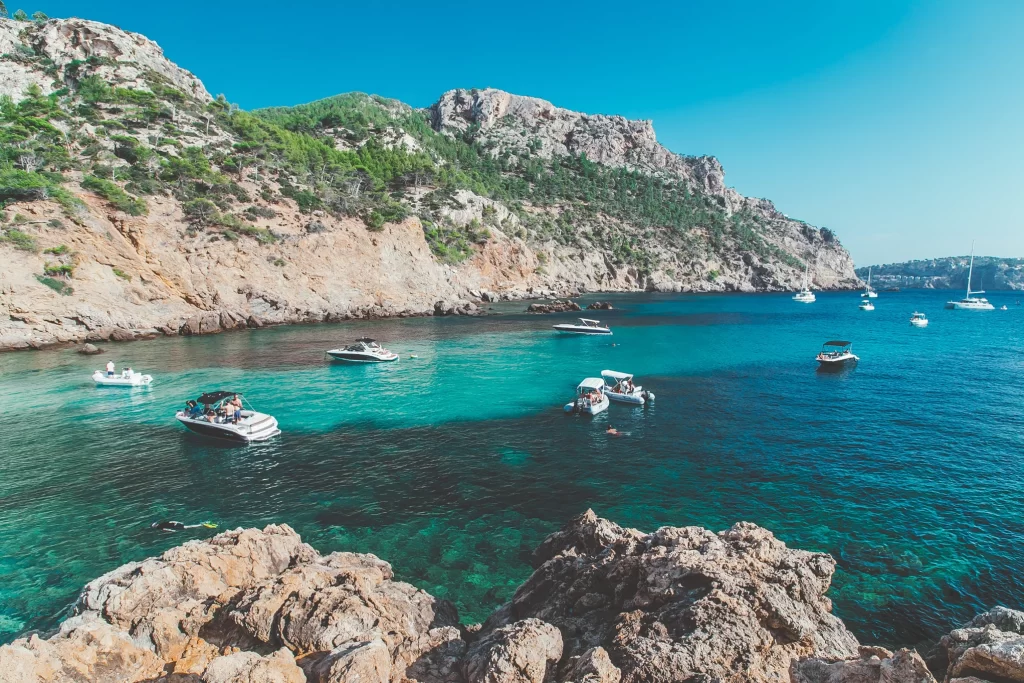
I may earn a small commission if you make a purchase using my affiliate links.
Hi! I’m Hazel ? I’m a British travel blogger based just outside London, with a soft spot for island escapes and Mediterranean sunshine. I’ve visited Mallorca over 10 times (and counting!) – exploring by car, bike, foot, and boat, from the olive groves of Sóller to the white sands of Es Trenc.
I create in-depth travel guides to help you plan the kind of trip I love myself: beautiful, well-balanced, and full of unforgettable local flavour. This Mallorca Travel Guide brings together everything I’ve learned over years of visiting the island – so you can plan with confidence, and enjoy every moment.
? So, Where Exactly is Mallorca?
Mallorca is the largest of Spain’s Balearic Islands, floating in the western Mediterranean Sea. It’s about 170km off the east coast of mainland Spain – just a short hop from Barcelona or Valencia.
Mallorca Facts: Know Before You Go ?
⏰ Time zone: GMT +1.
? Currency: Euro (EUR).
?? Language: Spanish (and Mallorquín, the local dialect).
⚡ Plug type: Type C & F (two round pins).
✈️ Flight time from London: approx 2 hours.
? Best way to get around: Rent a car for max freedom. I recommend Discover Cars (a car comparison website).
Mallorca’s Geography & Landscape ?
Mountains meet the sea in Mallorca. The Serra de Tramuntana mountain range (a UNESCO site) runs along the island’s northwest, offering hairpin drives and hiking galore. The interior is dotted with vineyards and sleepy stone villages, while the coast is all about hidden coves (called calas), sandy beaches, and pretty harbours.
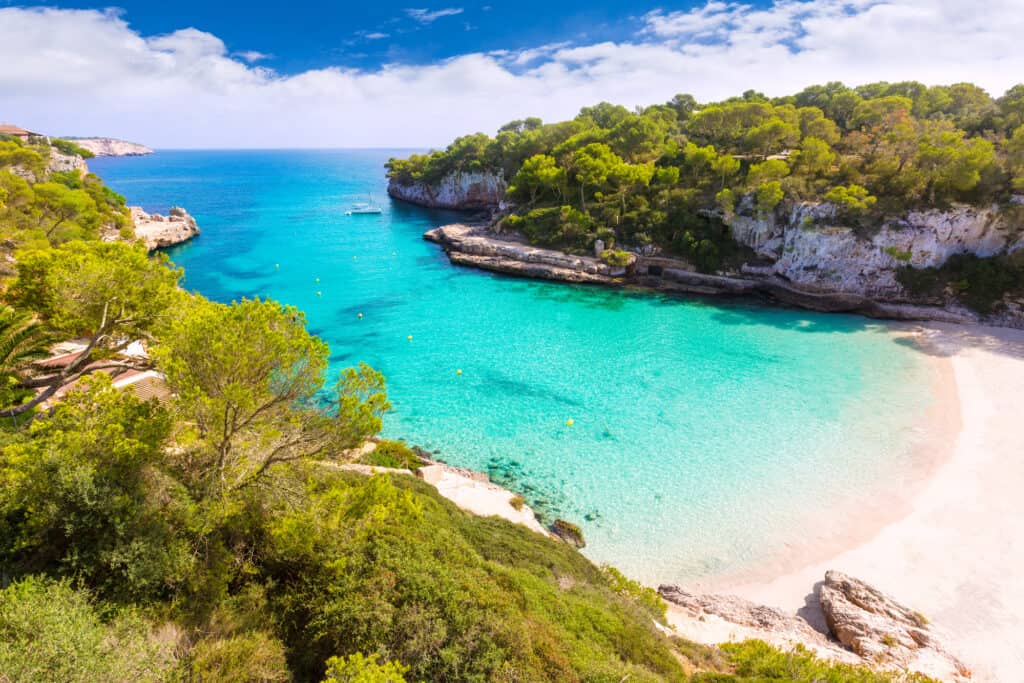
Top geographical highlights:
- Serra de Tramuntana: hiking, cycling, and incredible views.
- Cala Llombards: picture-perfect beach in the southeast.
- Es Trenc: one of the best beaches, with Caribbean-style sands.
- Parc Natural de S’Albufera: birdwatcher paradise near Alcúdia.
? Map of Mallorca
Getting to Mallorca & Around the Island ✈️
By air: Palma de Mallorca Airport (PMI) is the island’s main hub.
By sea: Ferries connect Mallorca to mainland Spain and the other Balearics.
Getting around:
Cycling: Popular thanks to varied terrain and scenic roads.
Car hire: Best for exploring the island fully (drive on the right!)
Buses: Affordable and good for major towns via TIB (Transport de les Illes Balears).
Trains & trams: Don’t miss the vintage wooden train from Palma to Sóller.
Boats: Great way to see the coastline.

When to Visit Mallorca?
Winter (Dec–Feb): Mild and peaceful, ideal for cultural travel.
Spring (Mar–May): Perfect for hiking, biking, and seeing the island in bloom.
Summer (Jun–Aug): Hot, sunny, and buzzing – best for beach lovers.
Autumn (Sep–Nov): Fewer crowds, warm sea, great for foodies.
Towns to Explore in Mallorca ?
Palma buzzes with Gothic architecture and tapas bars, Sóller charms with its orange groves and vintage tram, and Valldemossa stuns with cobbled alleys and Chopin history.
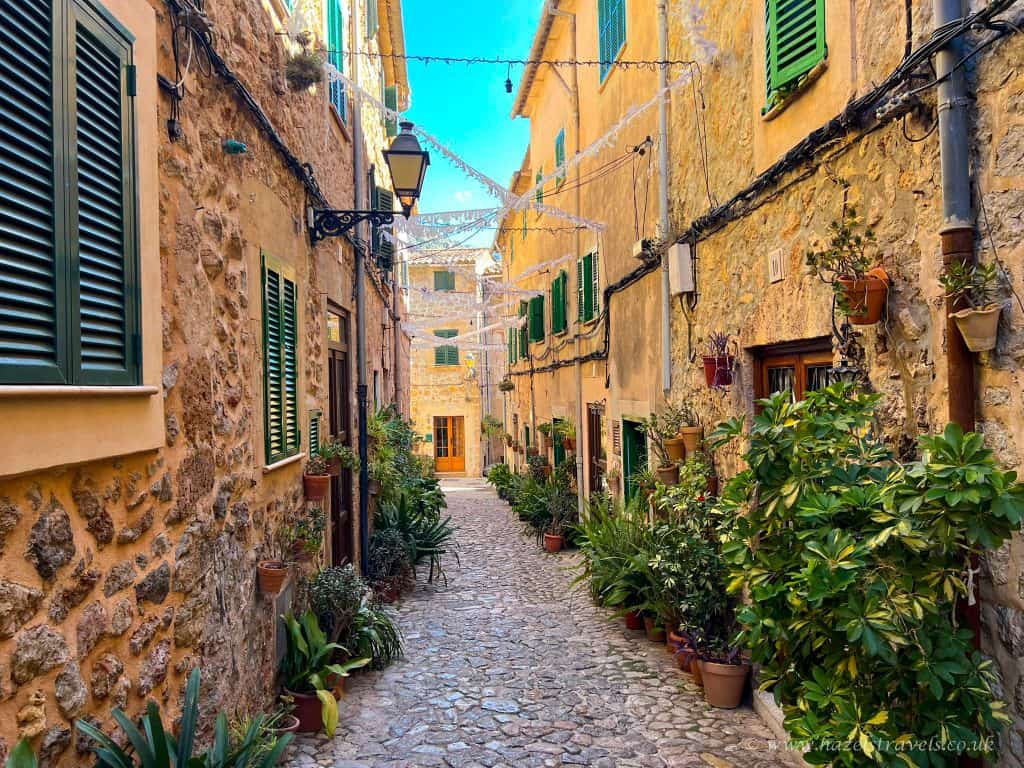
Further north, Pollensa offers art and hiking, Alcúdia pairs medieval streets with sandy beaches, and Fornalutx is often called Spain’s prettiest village.
Read my post 10 Beautiful Towns in Mallorca You Have to Visit ? for more inspiration.
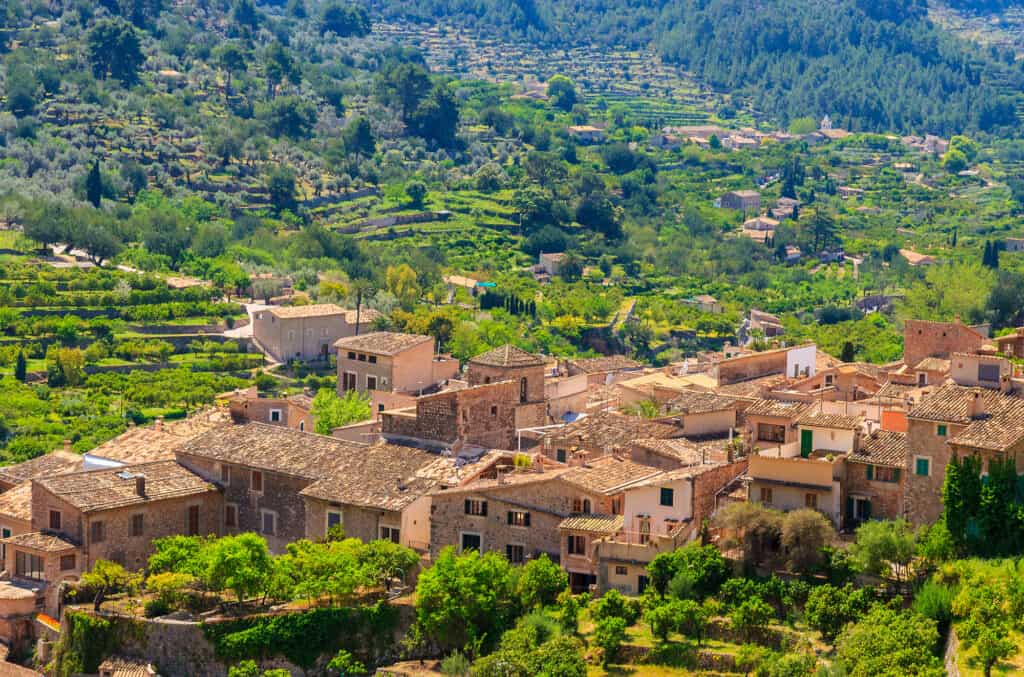
Top Sights & Must-Dos in Mallorca ?
Local markets: Don’t miss Sineu (Wed) or Alcúdia (Tues & Sun).
Palma Cathedral (La Seu): Gothic masterpiece with Gaudí touches.
Bellver Castle: Circular fortress with killer city views.
Caves of Drach: Stalactites, an underground lake, and live music!
Cap de Formentor: Dramatic cliffs and scenic drives.
Sa Calobra: Twisty road and gorge walk that ends at a hidden beach.
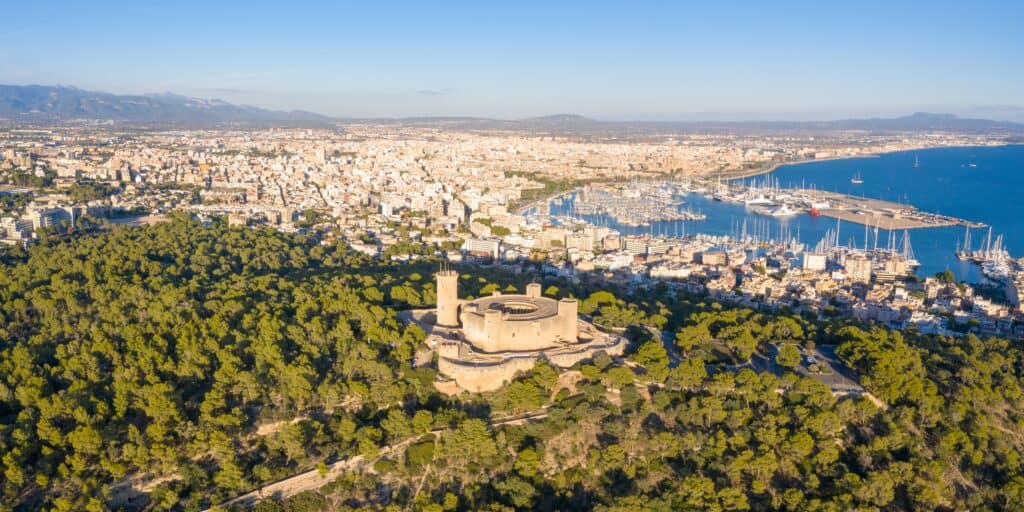
Quick Tips for Visiting Mallorca ?
? Book your rental car early in summer.
? Carry some cash for village markets.
? Don’t expect dinner before 8pm – tapas culture runs late.
? Pack reef-safe sunscreen & a reusable water bottle.
? Explore Palma in the morning or evening to dodge peak heat & crowds.
What to Eat & Drink in Mallorca ?️
Mallorcan food is rustic, flavourful, and perfect for sharing. Don’t leave without trying ensaimada (a sugar-dusted pastry), sobrasada (spicy sausage), tumbet (a veggie bake), or arros brut (a hearty rice stew).
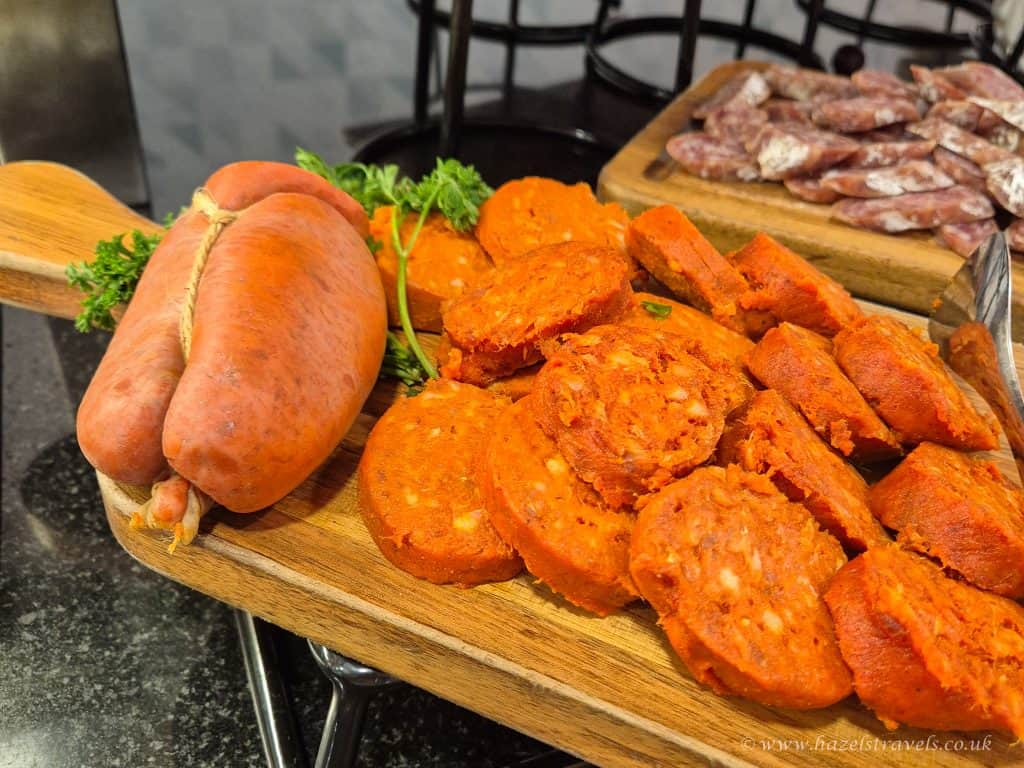
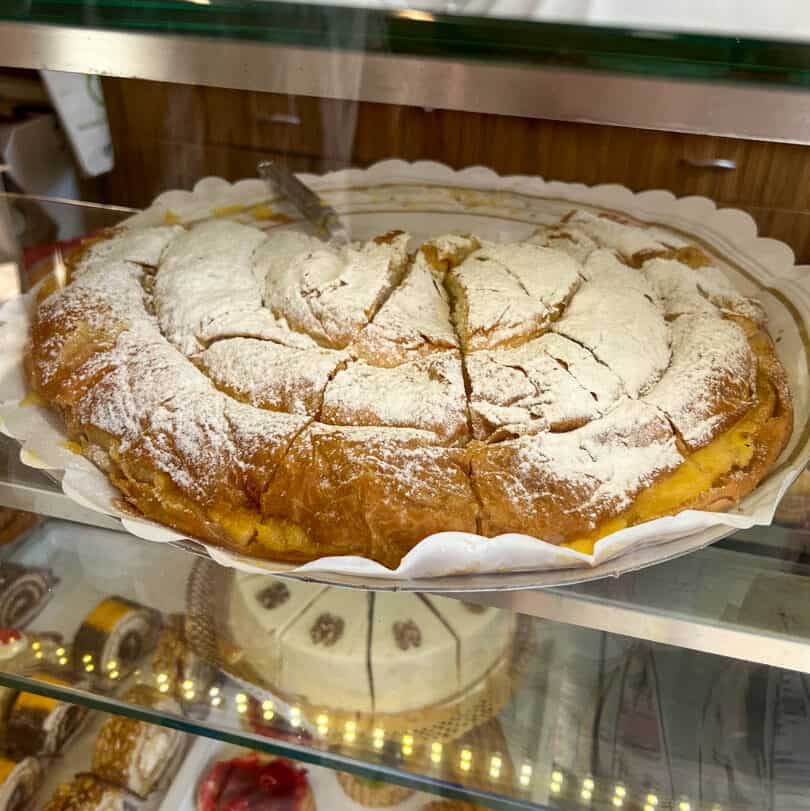
Wash it all down with a glass of local wine or vermouth. For a deep dive into the island’s flavours, check out my post Food of Mallorca: What to Eat and Drink on the Island ???.
Where to Stay in Mallorca?
Here are some of the best areas to stay, with Booking.com links so you can check prices and availability:
- Palma – Perfect for city breaks and easy access to nightlife and culture. Hotels in Palma.
- Sóller / Port de Sóller – Ideal if you love mountains and the sea in one place. Hotels in Sóller.
- Pollensa – Elegant and peaceful, great for couples. Hotels in Pollensa.
- Alcúdia – Medieval charm plus family-friendly beaches. Hotels in Alcúdia.
- Valldemossa – Romantic hilltop village vibes. Hotels in Valldemossa.
- Santanyí / Cala d’Or – Boutique stays close to stunning beaches. Hotels in Cala d’Or.
Map of Hotels in Mallorca ?️
Booking.comTop Tours in Mallorca ?️
? Combo day trip: train to Sóller, tram to the port, and boat to Sa Calobra
? Experience the Best Beaches and Coves of Mallorca.
? Wine tastings at rural vineyards.
⛵ Mallorca sailing with locals.
? Spanish Cooking Experience in Mallorca.
Sustainable Travel Tips ?
Travel responsibly and keep Mallorca beautiful with these eco-friendly ideas:
? Leave no trace – Stick to hiking trails, respect wildlife, and take all rubbish with you.
? Use public transport – Buses and trains reduce your carbon footprint and traffic on narrow island roads.
? Cycle whenever you can – Mallorca is a cyclist’s paradise, with scenic routes and plenty of rental options.
?♀️ Explore on foot – Towns like Valldemossa, Deià, and Palma’s Old Town are best enjoyed slowly.
? Bring a reusable water bottle – Tap water is safe to drink; refill instead of buying plastic bottles.
?️ Carry a reusable bag – Say no to plastic when shopping at markets.
? Support local producers – Shop at markets in Sineu or Alcúdia and buy handicrafts made on the island.
? Stay local – Family-run hotels and eco-friendly fincas keep your money in the community.

FAQs About Mallorca❓
Frequently asked questions all about the island of Mallorca.
A: Yes, Mallorca is one of the safest holiday destinations in Spain, with low crime rates and a welcoming atmosphere.
A: Renting a car is the easiest way to explore beyond Palma and the main resorts. However, buses, trams, and ferries cover most popular routes.
A: Tap water in Mallorca is safe to drink, though many visitors prefer bottled water due to the mineral taste.
A: Spanish and Catalan (Mallorquín) are official languages. English is widely spoken in tourist areas.
A: Highlights include Palma Cathedral, Bellver Castle, the Serra de Tramuntana, Cap de Formentor, and the Caves of Drach.
A: Mallorcan cuisine features ensaimadas, sobrasada, tumbet, arros brut, and delicious local wines. See my guide Food of Mallorca for details.
A: From Chopin’s winter stay in Valldemossa to hidden pirate caves, Mallorca has plenty of surprises. Discover more in Unusual Facts About Mallorca ?.
Related Reading for Mallorca ?
?10 Beautiful Towns in Mallorca You Have to Visit.
???Food of Mallorca: What to Eat and Drink on the Island.
?Unusual Facts About Mallorca: 29 Cool Things You Probably Didn’t Know.
Pinterest Pins ?
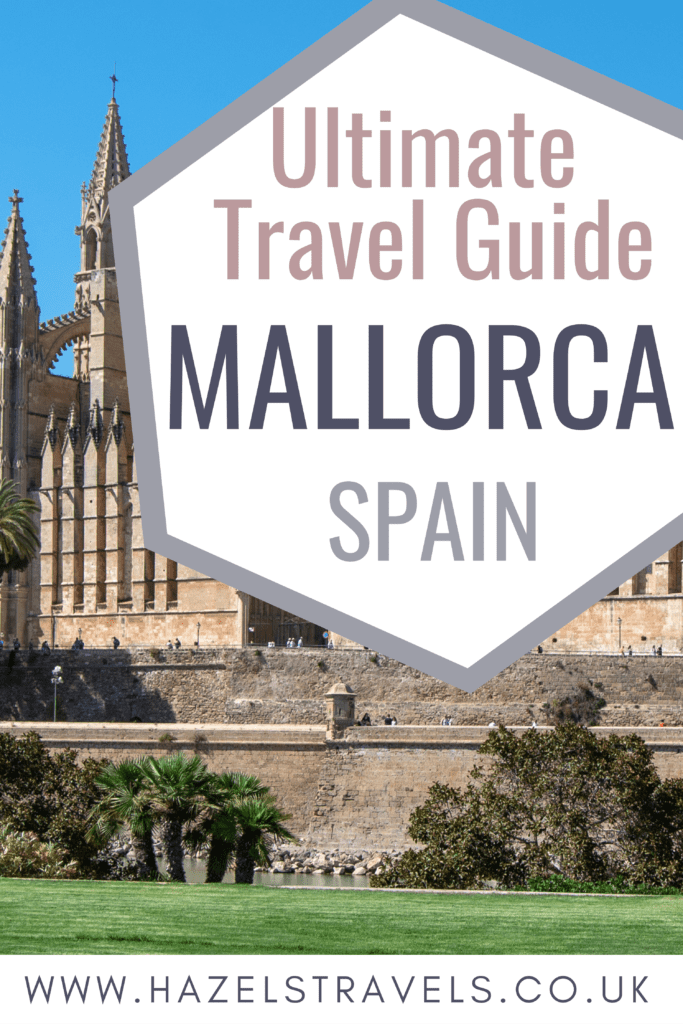
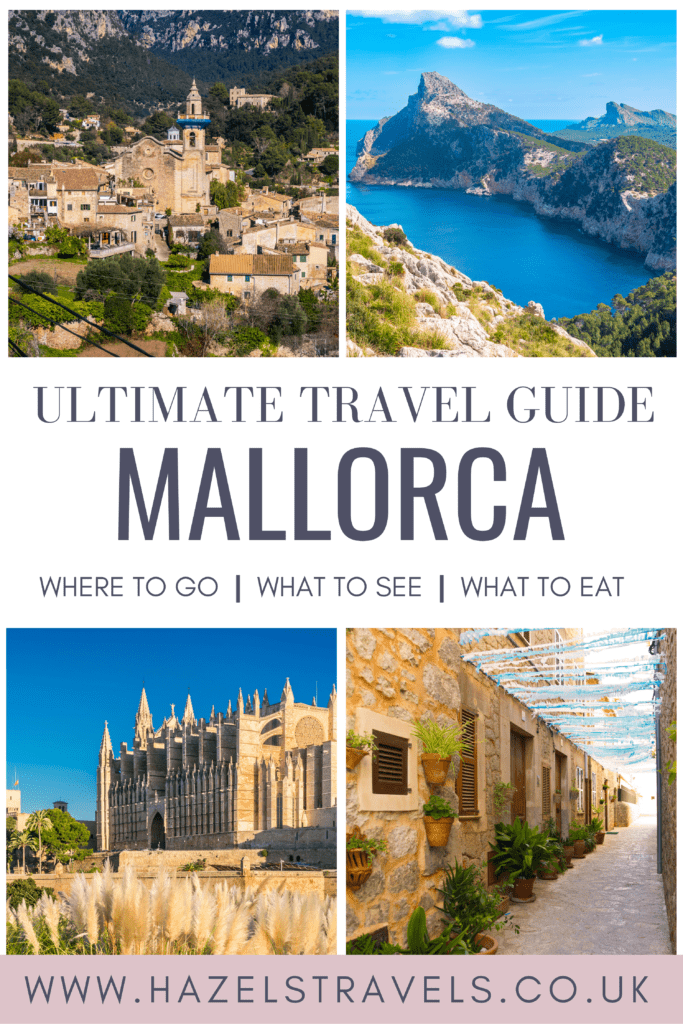
Ready to explore Mallorca? This Mallorca Travel Guide has got you covered – let’s go! ✨
👉 Looking for practical travel tools? Check out my Travel Resources page.


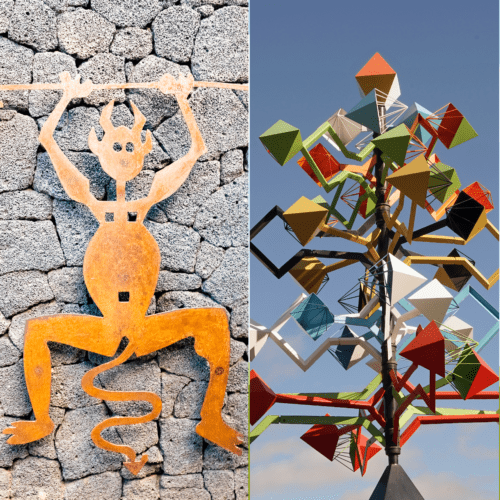
Leave a Reply